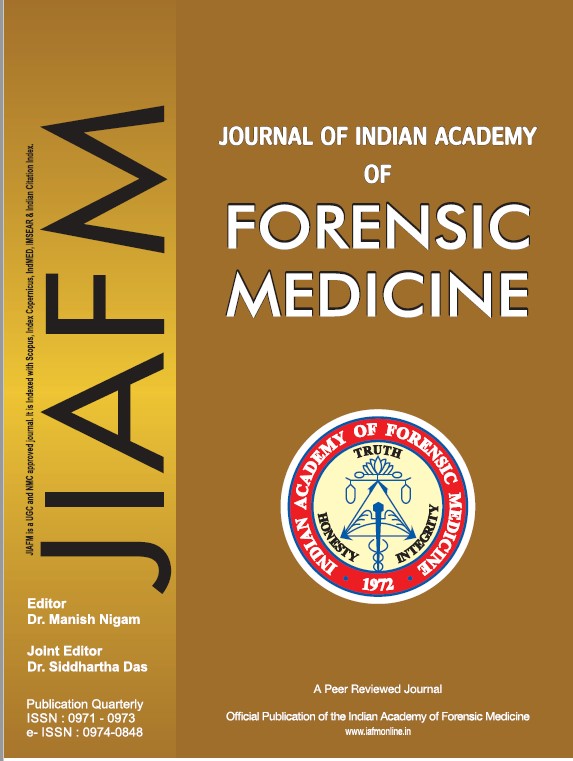Prevalence of Mental Illness in Inmates of District Jail of Etawah
DOI:
https://doi.org/10.48165/Keywords:
Mental Illness, Schizophrenia, Offence, Substance abuse, PrisonersAbstract
This paper presents the prevalence rates of mental illness like schizophrenia and major affective disorders by age, substance abuse and nature of offence among male jail detainees. This study was aimed to study socio-demographic profile of prisoners of district jail and to find out the current prevalence of mental illness among prisoners. This study was carried out on total 1200 male prisoners in district jail of Etawah. We included only those prisoners who were clinically diagnosed as suffering from some mental health problem and were under psychiatric treatment for the same. Out of the total 1200 prisoners only 79 were found to be suffering from some sort of mental illness. A large part of mental morbidity was contributed by substance abuse and its related consequences. We have observed that most of the mentally disturbed individuals are involved in commission of violent offences. There could be a significant reduction in crime rates if such individuals were timely diagnosed and treated thus we recommend regular checkup of all prisoners by a psychiatrist for early diagnosis and treatment.
Downloads
References
Nurse J, Woodcock P, Ormsby J. Influence of environmental factors on mental health within prisons: Focus group study. BMJ 2003;327:480‑ 5
American Psychiatric Association, Diagnostic and Statistical Manual of Mental Disorders, fourth edition (DSM-IV), 1994.
James DJ, Glaze LE. Mental Health Problems of Prison Inmates. Special Report of the Justice Statistics. 2006.US Department of Justice, Office of Justice Programs, Bureau of Justice Statistics, Washington DC
Kumar V, Daria U. Psychiatric morbidity in prisoners. Indian J Psychiatry 2013;55:366-70
Mishra et al. Attitude towards Psychiatric Research. Indian J Med Res 139, February 2014, pg. 246-251
PSA Pillai. Criminal law (IPC)as per the criminal law amendment Act 2013,12th edition 2015
Math SB, Chandrashekar CR, Bhugra D. Psychiatric epidemiology in India. Indian J Med Res 2007;126:183‑ 92
Way BB, Sawyer DA, Lilly SN, Moffitt C, Stapholz BJ. Characteristics of inmates who received a diagnosis of serious mental illness upon entry to New York State Prison. Psychiatric. Serv. 2008; 59:1335–1337
Herrman H, McGorry P, Mills J, Singh B. Hidden severe psychiatric morbidity in sentenced prisoners: an Australian study. Am J Psychiatry 1991; 148: 236-9
Bhojak MM, Krishnan SR, Nathawat SS, Bhojak M. Psychiatric and psychological aspects of convicted murderers and non‑ murderer. Indian J Psychology 1998; 26:98‑ 103
Goyal SK, Singh P, Gargi PD, Goyal S, Garg A. Psychiatric morbidity in prisoners. Indian J Psychiatry 2011;53:253‑ 7 12. Mason D, Birmingham L, Grubin D. Substance use in remand prisoners: A consecutive case study. BMJ 1997; 315:18‑ 21. 13. Gavin N, Parson S, Grubin D. Reception screening and mental health needs assessment in a male remand prison. Psychiatric Bulletin 2003;27:251‑ 3
Math SB, Murthy P, Parthasarathy R, Naveen Kumar C, Madhusudhan S. Mental health and substance use problems in prisons: Local lessons for national action. Publication, National Institute of Mental Health Neuro Sciences, Bangalore


